Do We Need a Royal Family in Britain
Do nosotros need | a purple family?
The United kingdom has had a royal family since the ninth century simply is it at present fourth dimension to let go of this historic period-onetime tradition? They accept more than privileges than most of us. But what nearly everything they practise for charity and beyond? Hmm...
Test your royal knowledge!
How much power does the Queen actually have?
Dr Priya Atwal (University of Oxford) takes u.s. on a whistle-stop tour of the UK monarchy, commenting on its history and explaining the role that the Queen has today.
More
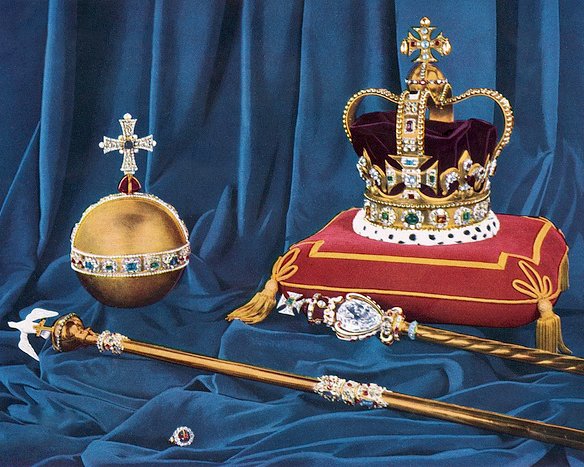
The history of Great britain'due south monarchy and regal family is pretty special. It's packed with plenty of drama and surprising plot-twists, but it'due south also quite unique because (alongside Kingdom of denmark) Britain has the oldest monarchy in Europe. The electric current queen, Elizabeth II, can actually trace her family unit roots all the way back to the ninth century: starting with her ancient ancestor, Rex Egbert of Wessex!
So what exercise nosotros mean past the term 'monarchy'? A monarchy in the strongest sense of the term means a state governed by a unmarried ruler (known as a king or queen). They have absolute power and they laissez passer this power to their heirs. This is ordinarily their children or closest blood relations. By 'absolute ability', nosotros hateful that the monarch has the right to practise anything they choose: including making decisions near people'due south lives, demanding money from them whenever they like, deciding how the land should exist run and even whether or not go to state of war with other countries.
The Queen today does not have any such rights. Instead, Britain is ruled over past a 'constitutional monarch'. In other words, a male monarch or queen whose powers are limited by the laws of the land. Laws that are drafted and passed past members of Parliament, who are themselves elected by ordinary people over the historic period of 18 who are allowed to vote. The Queen can yet pass up (veto) a police, only if that happened today information technology would cause huge controversy (the terminal time that the 'Royal Assent' was refused was back in 1707!).
Over the centuries, Britain has witnessed endless struggles between the Crown and its subjects, which accept gradually resulted in the power of the monarchy being whittled abroad.
1 of the biggest showdowns in royal history was the clash between Rex John of England and a group of 'rebel barons' of England in 1215, which led to the signing of one of the most famous legal documents in the world, the Magna Carta. Although this document ultimately had little success in bringing peace between the overbearing king and his subjects in their lifetime, it'due south still celebrated in English history as setting in stone the principle that a monarch should have to respect and live past the law in merely the same way as one of their subjects. Information technology besides preserved the thought that the rights of individuals had to take priority over the personal wishes of the male monarch, significant that the Crown has a duty to govern responsibly.
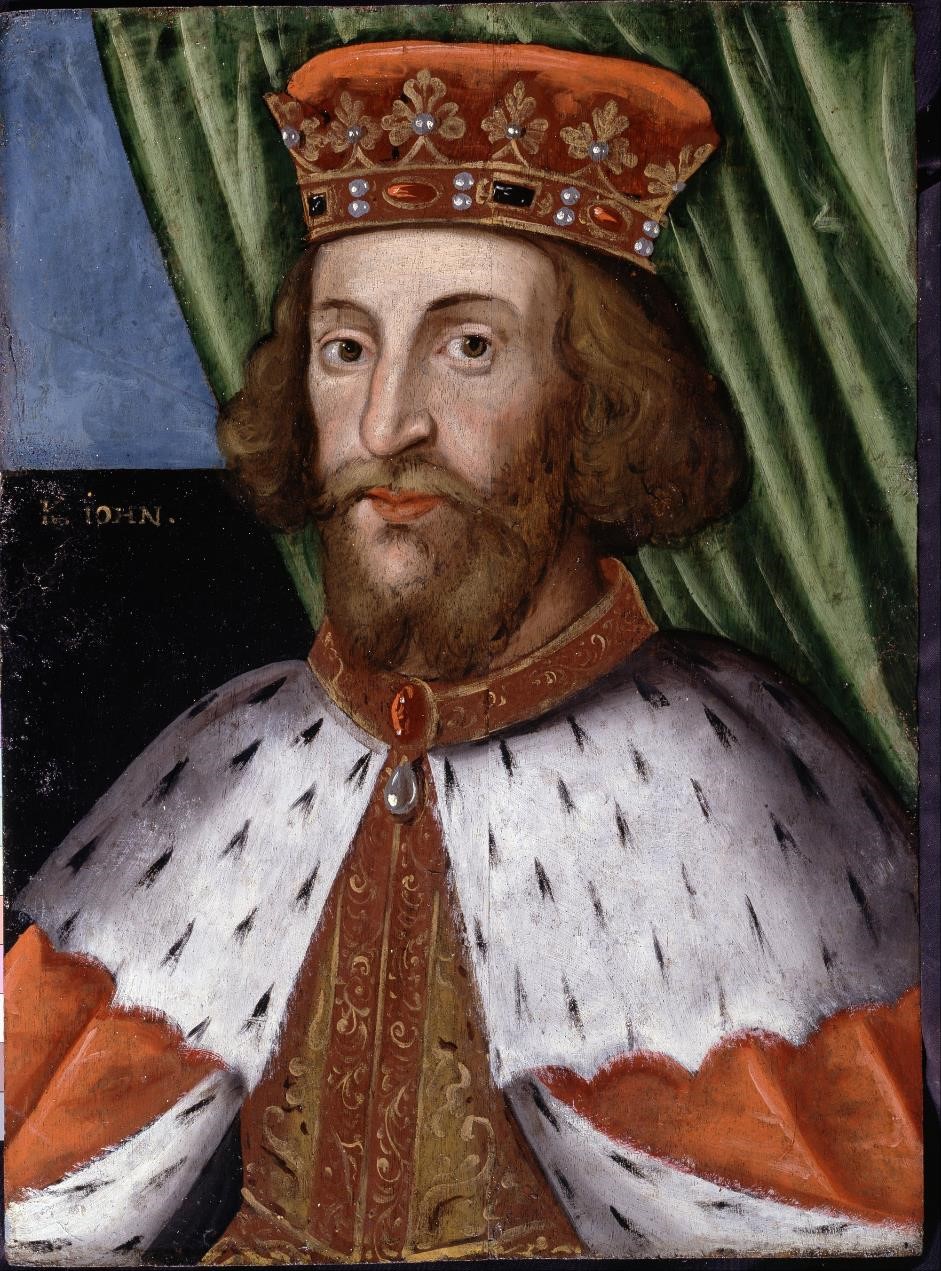
Prototype: King John of England
The seventeenth-century Stuart kings were perhaps the well-nigh infamous for messing with these principles, and their attempts to do so backfired on them dramatically! The Scottish dynasty inherited the English throne from Elizabeth I and were firm in their belief that they had a 'divine' or God-given right to accented power. James I even fix out his ideas in a book chosen Basilikon Doron (Greek for 'royal souvenir'). In this text, James explained his vision for how to be a good and constructive king. He argued that the monarch should not act equally a tyrant merely that their powers were derived from God alone and could non be controlled by laws or his subjects. His son and heir, Charles I would attempt to put such ideas into practise in his ain way, but it didn't become so well, especially after he tried to demand taxes from the people without first asking for the consent of Parliament. He ended up provoking a civil state of war in England, and was later imprisoned, convicted of loftier treason and then beheaded in 1649!
Britain underwent a unique catamenia of rulership without a monarch later Charles' execution. This but lasted until 1660 withal, when Charles Two (Charles I's son) was given the throne back after the collapse of Oliver Cromwell's republican regime. The British people have kept kings and queens on the throne ever since then. This history suggests that the function and authority of monarchy in Britain is pretty fixed and that the Crown is not an institution that is probable to be gotten rid of easily. However, alongside this it's important to remember that many deliberate efforts have been made to reduce the power of the Crown very significantly since the reign of Charles Ii. Ordinary men and women have gained a much stronger voice in the running of the state through Parliament as a result of the major political changes that have occurred in the past four centuries.
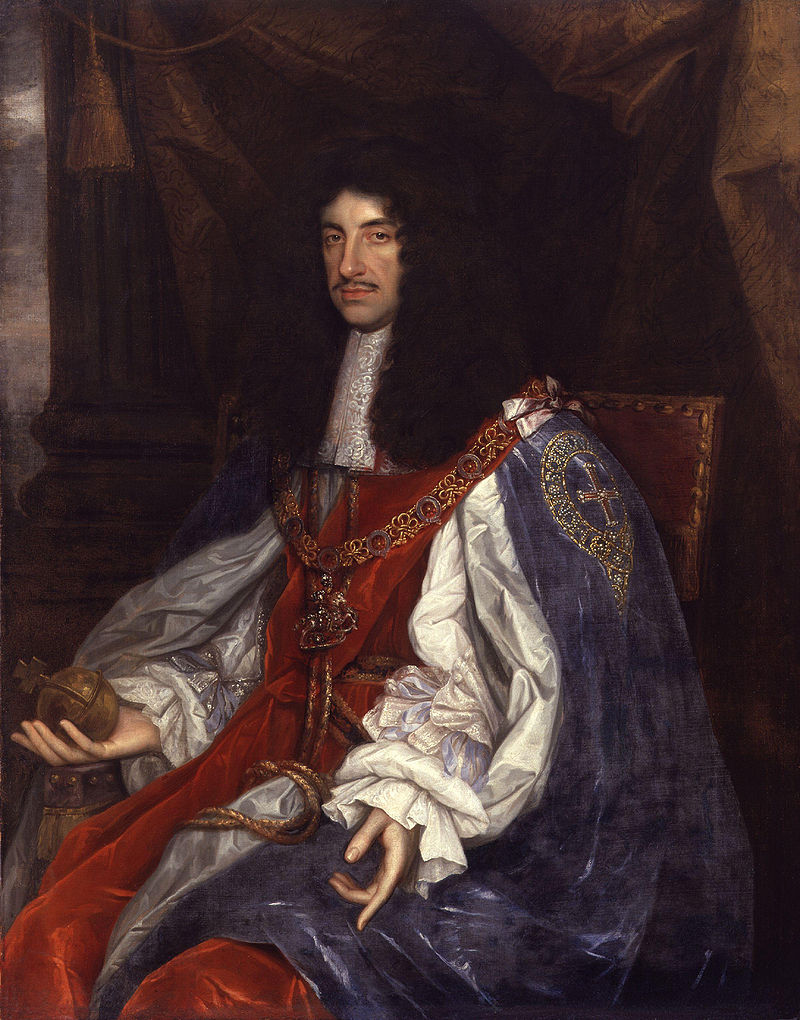
Image: Charles II
This has meant that the activities and nature of Britain's monarchy have besides changed dramatically over fourth dimension, with the Crown taking on more of a ceremonial and influential role, rather than a directly political and powerful one. The reigning Queen still gets access to all sorts of official and cloak-and-dagger papers produced past the government, and has regular meetings and conversations with the Prime Minister. She is also the head of Britain'due south armed forces and the Church of England, as well as of the Democracy (the association of countries that were formerly part of the British Empire). And without her signature, any laws passed by Parliament are void. Unlike her Stuart predecessors however, instead of existence able to dictate the making of new laws or actively straight the regime in the business of running the country, the Queen at present but enjoys the 'right to be consulted, the right to encourage [and] the right to warn'. Most of her speeches are actually written for her by government ministers, as the monarch is no longer allowed to express his/her own political opinions publicly.
Of grade, the Queen still enjoys some incredible perks with her task, even if she has less power. She lives in some of the finest buildings in the state, she doesn't need a passport to travel and she also owns all of the dolphins and whales in British waters!
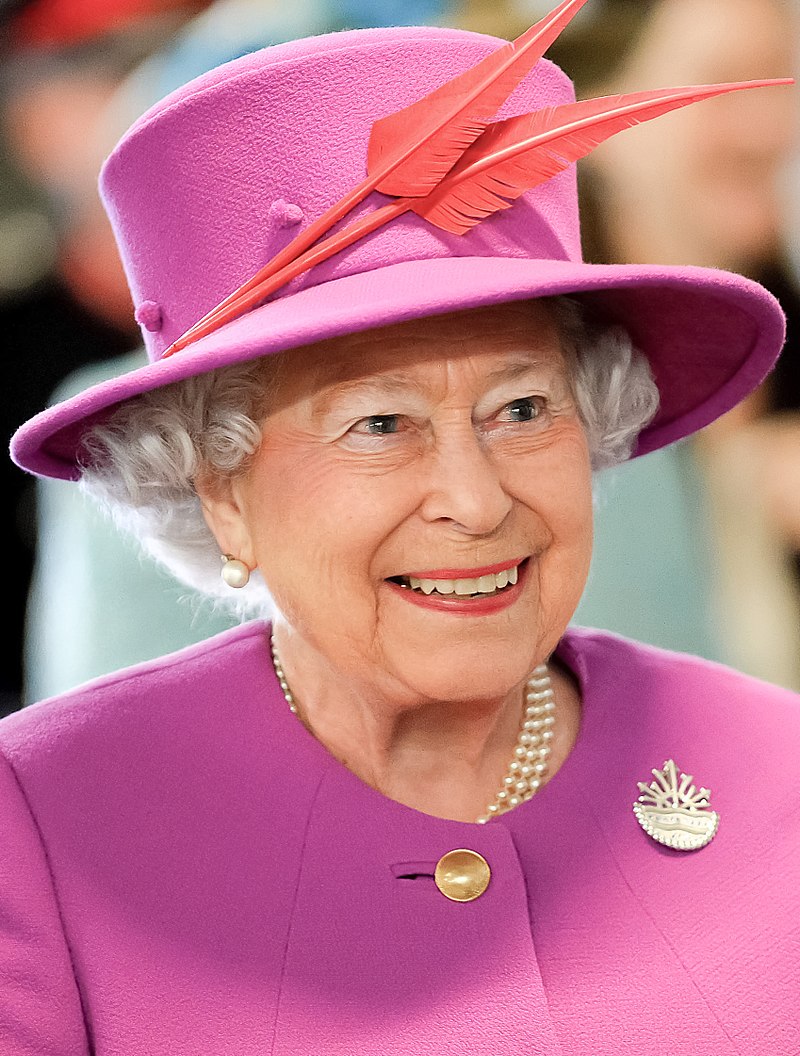
Epitome: Queen Elizabeth II in 2015
Royal firsts - what have monarchs brought us?
- The flushing toilet
-
The first always 'h2o closet' or flushing toilet was invented some fourth dimension in 1584-91, by Sir John Harington, the godson of Queen Elizabeth I. Harington was a well-known poet and admirer, but he got into trouble afterwards writing some peculiarly dodgy poetry, and was excluded from the Queen'southward court until he could brand apology. While hiding away at his newly-built business firm in Kelston, near Bathroom, inspiration of a completely different kind seems to take struck Harington, and he came up with an idea for making a flushing toilet! He invited Elizabeth I to visit his home in 1592, during which time she tried out his loo. Obviously she liked it so much that she forgave him for his earlier mistakes and requested that he build her a loo as well, at her palace!
-
- Photography
-
We are used to seeing the Royal Family unit splashed over the covers of magazines and newspapers. But did you know that Prince Albert and Queen Victoria were instrumental in making photography a popular form of art and media in England? They attended exhibitions and became enthusiastic collectors of the new kinds of printed pictures that early on photography pioneered in the 1840s. They also became patrons of the newly-established Photographic Guild of London. The Queen and Prince Consort also deputed photographers to have pictures of themselves, their family and friends, and their favourite scenes, which they nerveless together into beautifully-bound photograph albums. Like the Royal Family today, yet, they were not besides pleased about photos existence published of them without their permission. As a issue, they ended upwardly fighting the get-go e'er legal cases to defend their rights over pictures of themselves.
-
- The Church of England
-
The 'Church of England' or 'Anglican Church' was finer founded by King Henry 8 in the 1530s, afterward he decided to break with the Pope and the Catholic Church in Italia. Henry 8 infamously wished to divorce his first wife, Catherine of Aragon, so that he could marry his mistress, Anne Boleyn. However, being a member of the Catholic Church building, which was against divorce, Henry was not immune to finish his marriage to Catherine and so he resorted to drastic measures to get his manner. He dramatically broke off ties with Catholicism and appointed religious scholars to produce research that would enable him to justify this motion, every bit well as to support his claim to be the rightful head of the Church in England instead of the Pope. This allowed Henry not simply to marry Anne Boleyn (and later, 4 other wives!) simply also to transform the Church of England into a Protestant church building rather than a Catholic one. This motility brought about a major and long-lasting cultural shift beyond Britain and caused decades of disharmonize betwixt England and its powerful Cosmic neighbours in Europe.
-
- Tax scandals
-
Monarchs and revenue enhancement have long had a messy and complicated history. The current queen, Elizabeth Ii, became the start reigning monarch to pay taxes from 1992, fifty-fifty though the sovereign is non legally obliged to pay anything. The Queen agreed to practise then subsequently a terrible fire ravaged her favourite royal residence, Windsor Castle. It was a good motility to win over the public, after they were saddled with a hefty restoration nib (£36.v one thousand thousand!), at a fourth dimension when the monarchy's popularity was weak in Britain. Still, only recently a new tax scandal raised new questions about how the monarchy spends its money. This happened when the publication of the Paradise Papers by British newspapers revealed that millions of pounds from the Queen'due south private estates had been invested in offshore tax havens - said to exist without the Queen'southward knowledge.
-
- Smallpox vaccine
-
In the eighteenth century, smallpox dramatically changed the succession of the British royal family unit from the Stuart dynasty to their cousins, the rulers of Hanover. The disease killed off the xi-twelvemonth old Prince William, the only son of Queen Anne, in 1700. This meant that the Crown ended up passing to George I who travelled from the modest German country of Hanover to accept over the British throne in 1714, bringing his family with him. England was hit by some other smallpox outbreak in 1722. This time withal, i of the most well-known ladies in fashionable English society, Lady Mary Wortley Montagu, was not prepared to permit the disease take as many lives as information technology had done in the past. She had stayed for some time in Turkey, where her husband was working as a diplomat, and whilst there had experienced the Turkish method of vaccinating against smallpox. A liquid containing a small amount of the live smallpox virus was mixed into a cut in the peel of a good for you person, to enable their body to develop the disease but in a form that could be more safely overcome. Lady Mary persuaded Caroline, Princess of Wales (wife of the futurity George Two) to vaccinate her own children using this procedure. The royal family waited for the results of tests carried out on prisoners at Newgate before getting vaccinated themselves. But later seeing how successful the attempt was, Rex George I agreed to have his grandchildren treated – and they survived. This very active royal stamp of blessing meant that vaccination became much more than widely accepted across British society, and helped to pave the fashion for the life-saving impact subsequently made by Edward Jenner's vaccine.
-
- New media
-
Royals throughout history have often been quick to acquire nearly and embrace new ways of communicating, and then that they could more effectively run their kingdoms and portray themselves co-ordinate to their want. But even in more modern times, when the monarchy has taken on more than of a ceremonial role, royal figures have not shied away from an interest in new types of communications technology. Queen Victoria was technically the outset person to send a transatlantic telegraph message, when a notation was sent in her proper name to President Buchanan of the USA, on sixteen August 1858. The message didn't quite manage to go through however, mainly because it was far besides long: consisting of 98 words in full, information technology took more than 19 hours to transmit! The reigning queen, Elizabeth II, did a much better job of keeping her message short and sweet when she sent the first purple tweet, whilst opening an exhibition at London's Science Museum in 2014. She is perhaps more famous for some other majestic technological first yet: the Christmas TV broadcast. The royal tradition of a Christmas broadcast began with radio speeches by the Male monarch in 1932, but 1957 saw the first live broadcast by the Queen on BBC television. Information technology was intended equally a manner of modernizing the monarchy and bringing information technology closer to ordinary families – through their Tv sets – and is still watched by millions of people today!
-
Prince William one time said: "Equally I learned from growing up, you lot don't mess with your grandmother [a.grand.a the Queen!]"
Prince William once said: "As I learned from growing up, you don't mess with your grandmother" [a.k.a the Queen!]
A imperial tour - what monarchy means to other parts of the world
A basic definition of 'royalty' is a person who reigns in the position of a male monarch or queen, or more broadly speaking, is thought to have 'regal blood' or status. Merely people's understandings of how royalty should work varies co-ordinate to culture. Today, there are 26 monarchies around the world, ruling over 43 countries in total. Permit's dig deeper…
- In some countries, women lead the style
- In nigh countries with monarchies, the claret or lineage of the father is considered the almost important in determining who gets to inherit the throne from among the reigning regal family. And in the majority of cases, the throne volition normally pass to a man east.m. the king's son inherits the throne, followed past his grandson, etc. In the UK, women were simply allowed to take the throne when in that location were no male person heirs bachelor. This rule had been in place for 300 years, but in 2011 it was agreed that if Prince William and Kate Middleton had a daughter first, she would exist allowed to inherit the throne and become queen even if she had a younger brother. In contrast, 'matrilineal descent' determined the order of succession in the Niger-Congo area of Africa (stretching from West Africa to Zambia in the southeast), as well as in Madagascar, and regions of West India and Southeast Asia. This is where 'royal blood' is only thought to be transmitted via women. This was certainly the case for the Bemba people of what is now northeastern Zimbabwe. Children built-in from a rex or prince without an African princess as a mother would non exist deemed fit for the throne. The bloodline of the purple women was prioritized over the royal men. Within the Asante kingdom in Westward Africa, information technology was acceptable for royal women to accept more one than husband or lover at a fourth dimension. Oftentimes the identity of a royal child'due south father would be kept a hush-hush in gild to protect the princess against any claims to ability that could be fabricated by the man.
- Being a prince tin be a risky business
- One of the defining features of a monarchy is that the right to dominion a kingdom should laissez passer from the ruler to a fellow member of their family unit, usually i of their sons. Nonetheless, in many cases, this form of succession is not exactly a unproblematic or pain-free process. In the sometime Mughal and Ottoman Empires of South Asia and the Heart E, the practice of 'open succession' prevailed. This is where the brothers and sons of the reigning emperor competed to the expiry confronting 1 some other, in order to capture the throne after the emperor died. In more than one instance also, such fell contest could break out during the lifetime of the emperor. In the Ottoman Empire, fratricide, or the killing of brothers, was seen by many sultans as an constructive way to guard against such threats. It became something of a tradition for newly-appointed sultans to have their brothers strangled with a silken cord in fact! By the seventeenth century, nevertheless, this gruesome practice shifted to the less deadly but still torturous practice of keeping princes imprisoned under a form of house arrest in a part of a sultan'due south palace known as the kafes (or 'gold cage'). This manner they could exist easily supervised and kept under tight control.
- Most kings in history have tended to have multiple wives
- In order to keep themselves and their families in power, monarchs accept historically used union as an of import social and political weapon. Union could strengthen a king or queen's ties with other agreeing and well-connected royal or aristocratic families. Information technology could also provide a committed married man or wife with whom to produce and train futurity heirs to the throne. However, the practice of a monarch marrying just one person at a time has been just been a consistent trend in Europe. Up until the nineteenth century, royalty from many other countries across the world take been much more willing to take multiple marital partners, and also concubines. Concubines are women who alive with a man, merely who are not formally married to him and do not accept equal status to a wife. It'southward idea that the strict ethics regarding family life that Christianity promoted has a lot to do with determining why virtually Western European purple families stuck with marrying simply 1 person. This partly explains why Henry Eight had to go to such lengths in society to divorce his offset wife, Catherine of Aragon. That said, he and other European kings and queens were not quite obedient plenty non to cheat on their husbands/wives as well!
- 'Royalty' doesn't always mean a 'imperial family'
- In some cases, 'royalty' can exist defined in an culling sense: through control over landed resources, or through embracing the particular pomp and fashion typically associated with monarchs. The Pope, as caput of the Cosmic Church building and the 'monarch' of the Vatican, is an example of when royal status can be claimed past a person or institution that is not directly connected with a regal family. Under international police force, the papacy is recognised as a monarchy, and popes take claimed the right to rule over territory in Italy since at least the eighth century. Interestingly, Sikhs view and place their holy scriptures, the Guru Granth Sahib, on a very royal pedestal. At a Sikh gurdwara (temple), the Guru Granth Sahib is treated not as a book, but every bit an apotheosis of the political and spiritual wisdom of God, who is worshipped as the Sacha Padshah ('the truest emperor'). The Guru Granth Sahib is looked after and approached with similar kinds of ceremony to those performed in sixteenth- and seventeenth-century India by visitors to the court of the Mughal rulers, who were the contemporaries of the ten founding Gurus (teachers/spiritual leaders) of the Sikh faith. For case, the Guru Granth Sahib is typically covered with a richly-decorated canopy, and a fly whisk is waved over it, to preclude any dust or flies from landing on it, equally was done to show respect to a Mughal emperor. Modern-day visitors to the gurdwara are expected to proceed participating in some of these traditions and to pay their respects to the Guru, by covering their heads in the presence of the Guru Granth Sahib, and bowing and making a minor offering before it.
Practise the Royals bring in more money than they cost?
Nearly seventy% of people in U.k. favour keeping the current monarchy, rather than becoming a republic with an elected head of state (YouGov, 2015). Alongside this, there's a long running-campaign for the monarchy to be abolished. Such campaigners for a republic often cite the cost of supporting the monarchy. Supporters of the monarchy, however, answer that monarchy is traditional and that people might non necessarily like a new president any more than than they do the queen...
More
So how much does the Imperial Family actually toll?
Official figures from the Crown Manor show that the royal family spent £56.8m in 2016/17. About one-quarter of this, or £14m, came from the Imperial Family's own funds. The remainder of £42.8m was funded past the taxpayer through the Sovereign Grant, a payment from the authorities to the Royal Family. To put this number into some kind of context, this amounts to about 65p per person in the U.Yard.
How is this money spent?
The expenditure can be cleaved down into three categories.
• The Majestic Family workforce: The Majestic Household employed 436 people in 2016/17 for diverse roles, including curators for museums, chefs, and engineers which accounted for £20.3m.
• Royal travel: The royal family unit uses a mix of charter (non regularly scheduled flights), and scheduled flights, and trains to go on official visits, nourish ceremonies and conduct their imperial business concern. This can get pretty plush since this has included a trip by The Prince of Wales on a charter plane to Northern Ireland for £35,000. In full, the royal family spent £iv.5m on travel in 2016-2017.
• Imperial bills: The Imperial Family unit spends about £32m on holding maintenance, utility bills, housekeeping and other expenditure. Spending in this category goes towards, for instance, hosting 97 Receptions, 43 Lunches, 7 Garden Parties, and 56 Dinners. Buckingham Palace, Windsor Castle, St. James's Palace and the Palace of Holyroodhouse, welcomed over 120,000 guests in 2016/17. With 27,000 cups of tea, 20,000 sandwiches and xx,000 slices of cake consumed at each garden party alone, you can imagine why this can be expensive!
And how much does the Royal Family bring in?
A widely discussed study from 2017 estimates that the annual contribution of the monarchy to the U.K. economy was £i,766m. This significantly outweighs the (directly) cost to the taxpayer of £42.8m. But this effigy is only an estimate with some uncertainty surrounding it.
With that doubtfulness at the back of our minds, we tin can, broadly speaking, interruption down the do good of the Royal Family unit to the economy into three parts:
Tourism
The Brand Finance Monarchy Report estimates that the monarchy boosts tourism by about £550m. In 2016, over two.7 million tourists visited Buckingham Palace, Windsor Castle, the Palace of Holyroodhouse and other key royal attractions. Revenues from tickets and merchandise sales make up a big clamper of that £550m. But at that place are besides indirect benefits to the economy, especially to places that the royal family has visited. According to the report, bookings for hotels increased thirty% year-on-year after the Knuckles and Duchess of Cambridge stayed on the island of Anglesey where Prince William was stationed during his military service.
However, those in favour of abolishing the monarchy - such every bit the political pressure group, 'Republic' - point out that people would proceed to visit places like Buckingham Palace and Windsor Castle if Britain was a republic, and historic buildings would proceed to make money for the country. Tourists yet visit historic palaces in countries like France, Italian republic and Germany – all countries which no longer have ruling monarchs, but still have plenty of visitors.
The video below gives more details almost 'Republic' and the key arguments the group presents for ending the monarchy:
The brand
The report estimates that through informal endorsements, imperial warrants and patronage, and other media coverage the Royal Family unit added an extra £887m to the economy. Informal endorsements are acts of (usually) one-off back up. For example, the actress sales of fashion brands that the Duchess of Cambridge and the royal children are seen wearing counts as this. Royal warrants are somewhat different in that they allow the warrant holder to brandish the regal arms to signal that the product is supplied to the Majestic Family, e.1000. Burberry and the Imperial Mail.
An instance of Imperial Patronage – official support for a make or a cause - is The Royal Foundation of the Duke and Duchess of Cambridge and Prince Harry. This raises funds for military machine veterans, young people, wild animals conservation, and mental health. It was founded in 2009 and raised £10.1 million in 2016 alone.
Majestic babies also count towards this brand event: Joshua Bamfield, managing director of the Center for Retail Research, estimates that the nascency of babe George was responsible for people spending £156m on royal infant souvenirs, in improver to £62m on drinks and £25m on food for parties celebrating the majestic newcomer.
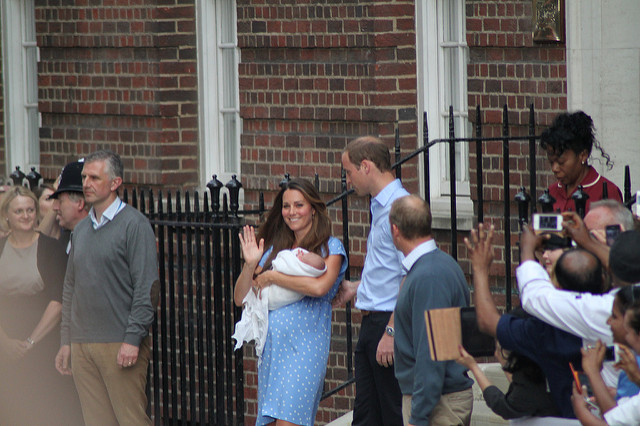
Image credit: Christopher Neve (CC BY-SA 2.0)
The Crown Estate
The Crown Estate is a collection of land and property which belongs to the monarchy. Information technology generates an annual turn a profit through rental payments and ground rent among other things. In 1760, nevertheless, George Three surrendered all revenues and profits from the Crown Estate to the government. In return he asked for annual payments from the regime to encompass his expenses, which is what we nowadays call the sovereign grant.
The value of the sovereign grant is much less than the profits made by the Crown Manor. And considering the U.Yard. government receives any remaining profits, the 2016 Crown Estate profits of £329m could exist counted as a direct benefit to the economy.
Even so, some people would suggest that this line of thinking is flawed arguing that the Crown Estate is essentially public state which has in the past been claimed equally monarch'due south property. Its profitability does not come straight from the monarch. And they pose questions such as: tin can things similar forest and farmland really be said to 'belong' to the crown? Should anyone have the right' to command that much land; or be given so much wealth – based on the actions of their ancestors several centuries agone and quirks of inheritance? This applies both to individual imperial wealth (essentially obtained through medieval conquests) and the money given through the sovereign grant.
A further argument that forms role of this objection is that monarchy tin be viewed as a symbol of inequality in Britain. The wealth of the Royals means they are very afar from 'ordinary' people on ordinary incomes. Although monarchy is 'traditional', could it now be fourth dimension to move on to a more than modern and democratic grade of governance?
And so is the Royal Family worth it?
With estimated benefits of £1,766m versus direct cost of £42.8m, for some people, this seems like an easy phone call to make. Still, the true cost of the Royal Family is not entirely articulate: yes, there is a direct payment but there are also the cost of security for events and buildings, which are usually borne by the hosting cities. These and other costs, 'Democracy' estimates to come to £345m, which is more than the NHS England spends on the Cancer Drugs Fund.
Even with this price estimate, the monarchy still returns nearly £5 for every £1 spent. And given that the upper estimate of £345m boils down to about £five.thirty per person per twelvemonth or about 1.5p per mean solar day, it'due south up to everyone to decide for themselves whether they think the Regal Family's benefits outweigh their cost.
That said - for people on both sides of the debate - monarchy is not just about the money - it's about the principle. Monarchists speak of the need to preserve tradition and respect the past, and republicans fence that monarchy is incompatible with a democratic guild.
What practise y'all think?
Exercise we need | a regal family?
Vote now
-
Read More
- Kate and Diana 'play same function as 16th century princesses'
- five ways to keep the imperial family relevant
- 5 celebs you didn't know were 'royal'
- Exercise nosotros need a royal family? Take this further...
- Delve deeper with Jack...
-
Sentry More
- What are Prince Charles' blackness spider memos?
-
Do More
- In a land far, far way: name the fictional monarch!
Source: https://oxplore.org/question-detail/do-we-need-a-royal-family
Postar um comentário for "Do We Need a Royal Family in Britain"